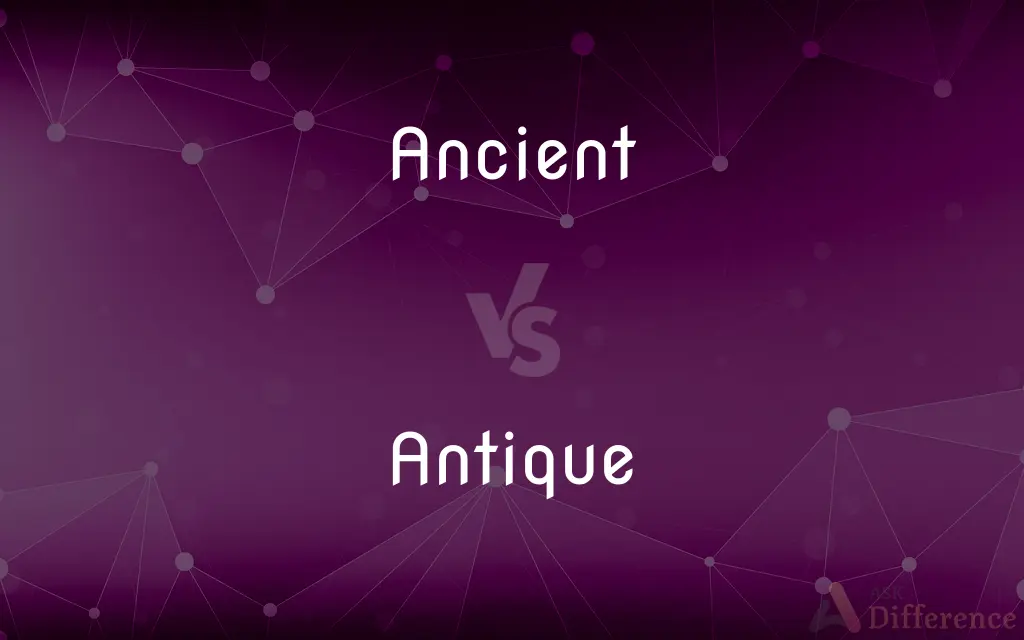Ancient vs. Antique — What's the Difference?
By Tayyaba Rehman & Fiza Rafique — Updated on September 16, 2023
"Ancient" refers to something that is extremely old, often from a distant historical period, like ancient civilizations. "Antique" also implies age but is commonly used for items that are at least 100 years old and collectible, such as antique furniture.

Difference Between Ancient and Antique
Table of Contents
ADVERTISEMENT
Key Differences
"Ancient" is an adjective often used to describe objects, civilizations, or practices that date back thousands of years or are from very early human history. The term carries a sense of time immemorial, and historical depth. "Antique," on the other hand, generally refers to items that are old but not as old as those described as ancient. Antique items usually have value because of their age, craftsmanship, or rarity.
Both "Ancient" and "Antique" are terms that help to position objects or concepts within a time frame, though the scales are different. While "Ancient" could refer to the Stone Age tools or the Pyramids of Giza, "Antique" would be more appropriate for a Victorian-era desk or a Model T Ford. The words both infer age but differ markedly in the degree of age they imply.
From a grammatical perspective, "Ancient" and "Antique" serve as adjectives. However, the usage often varies. "Ancient" is commonly used in a broader academic or historical context, while "Antique" is frequently found in conversations about collectibles or vintage items.
Interestingly, both "Ancient" and "Antique" can also function as nouns. For example, "the ancients" can refer to people from ancient civilizations, and "antiques" can mean collectible old items. However, "Ancient" tends to focus more on historical or cultural significance, whereas "Antique" is often more concerned with material value or craftsmanship.
Comparison Chart
Time Frame
Thousands of years, early human history
Generally at least 100 years old
ADVERTISEMENT
Context
Academic, historical
Collectible, vintage
Grammatical Role
Primarily an adjective; can be a noun
Primarily an adjective; can be a noun
Value Concern
Historical or cultural significance
Material value, craftsmanship, rarity
Typical Usage
Ancient civilizations, ancient texts
Antique furniture, antique cars
Compare with Definitions
Ancient
Extremely old, often relating to early human history.
The ancient artifact was discovered in a cave.
Antique
An object that is at least 100 years old and collectible.
The antique vase was a rare find.
Ancient
Having been in existence for a long time.
The ancient tree stood alone in the field.
Antique
Pertaining to an older time period, but not ancient.
The house was filled with antique furniture.
Ancient
Belonging to a distant historical period.
Ancient Rome was a powerful civilization.
Antique
Having value due to age, rarity, or craftsmanship.
The antique painting was sold at auction.
Ancient
Outdated or no longer in use.
The ancient software couldn’t run on modern computers.
Antique
Old-fashioned or out-of-date.
The antique notions no longer held sway.
Ancient
Pertaining to the wisdom of previous generations.
The tale was filled with ancient knowledge.
Antique
Demonstrative of a style or fashion of the past.
The room had an antique charm.
Ancient
Belonging to the very distant past and no longer in existence
The ancient civilizations of the Mediterranean
Antique
A true antique (Latin: antiquus; 'old', 'ancient') is an item perceived as having value because of its aesthetic or historical significance, and often defined as at least 100 years old (or some other limit), although the term is often used loosely to describe any object that is old. An antique is usually an item that is collected or desirable because of its age, beauty, rarity, condition, utility, personal emotional connection, and/or other unique features.
Ancient
An old man
A solitary ancient in a tweed jacket
Antique
A collectable object such as a piece of furniture or work of art that has a high value because of its age and quality
An antique dealer
Pauline loves collecting antiques
Ancient
A standard, flag, or ensign.
Antique
Having a high value because of age and quality
An antique clock
Ancient
Of, relating to, or belonging to times long past, especially before the fall of the Western Roman Empire (AD 476)
Ancient cultures.
Antique
Belonging to ancient times
Statues of antique gods
Ancient
Of great age; very old
"The males live up to six months—positively ancient, for a bee" (Elizabeth Royte).
Antique
Make (something) resemble an antique by artificial means
An antiqued door
Sanding will change the lustre of the sanded spot, especially if the finish has been antiqued
Ancient
(Archaic) Having the qualities associated with age, wisdom, or long use; venerable
"You seem a sober, ancient Gentleman by your habit" (Shakespeare).
Antique
Search or shop for antiques
They went antiquing almost every weekend
I antiqued all day with my mother
Ancient
A very old person.
Antique
Belonging to, made in, or typical of an earlier period
Antique furniture.
Ancient
A person who lived in times long past.
Antique
Of or belonging to ancient times, especially of, from, or characteristic of ancient Greece or Rome.
Ancient
The peoples of the classical nations of antiquity.
Antique
Relating to or dealing in antiques.
Ancient
The ancient Greek and Roman authors.
Antique
Having the appearance of an antique.
Ancient
(Archaic) An ensign; a flag.
Antique
Old-fashioned; outdated
Wore a suit of rather antique appearance.
Ancient
(Obsolete) A flag-bearer or lieutenant.
Antique
An object having special value because of its age, especially a domestic item or piece of furniture or handicraft esteemed for its artistry, beauty, or period of origin.
Ancient
Having lasted from a remote period; having been of long duration; of great age, very old.
An ancient city
An ancient forest
Antique
The style or manner of ancient times, especially that of ancient Greek or Roman art
An admirer of the antique.
Ancient
Existent or occurring in time long past, usually in remote ages; belonging to or associated with antiquity; old, as opposed to modern.
An ancient author
An ancient empire
Antique
To give the appearance of an antique to
Antiqued an oak chest.
Ancient
(history) Relating to antiquity as a primarily European historical period; the time before the Middle Ages.
Antique
To hunt or shop for antiques.
Ancient
(obsolete) Experienced; versed.
Antique
Having existed in ancient times, descended from antiquity; used especially in reference to Greece and Rome.
Ancient
(obsolete) Former; sometime.
Antique
Belonging to former times, not modern, out of date, old-fashioned.
Ancient
A person who is very old.
Antique
(typography) Designating a style of type.
Ancient
A person who lived in ancient times.
Antique
(bookbinding) Embossed without gilt.
Ancient
One of the senior members of the Inns of Court or of Chancery.
Antique
(obsolete) antic, specifically:
Ancient
(obsolete) A senior; an elder; a predecessor.
Antique
Fantastic, odd, wild, antic.
Ancient
A flag, banner, standard or ensign.
Antique
In general, anything very old; specifically:
Ancient
The bearer of a flag; ensign
Antique
An old object perceived as having value because of its aesthetic or historical significance.
Ancient
Old; that happened or existed in former times, usually at a great distance of time; belonging to times long past; specifically applied to the times before the fall of the Roman empire; - opposed to modern; as, ancient authors, literature, history; ancient days.
Witness those ancient empires of the earth.
Gildas Albanius . . . much ancienter than his namesake surnamed the Wise.
Antique
An object of ancient times.
Ancient
Old; that has been of long duration; of long standing; of great age; as, an ancient forest; an ancient castle.
Remove not the ancient landmarks, which thy fathers have set.
An ancient man, strangely habited, asked for quarters.
Antique
(in the singular) The style or manner of ancient times, used especially of Greek and Roman art.
Ancient
Known for a long time, or from early times; - opposed to recent or new; as, the ancient continent.
A friend, perhaps, or an ancient acquaintance.
Antique
An old person.
Ancient
Dignified, like an aged man; magisterial; venerable.
He wrought but some few hours of the day, and then would he seem very grave and ancient.
Antique
(obsolete) A man of ancient times.
Ancient
Experienced; versed.
Though [he] was the youngest brother, yet he was the most ancient in the business of the realm.
Antique
(typography) A style of type of thick and bold face in which all lines are of equal or nearly equal thickness.
Ancient
Former; sometime.
They mourned their ancient leader lost.
Antique
(obsolete) antic, specifically:
Ancient
Those who lived in former ages, as opposed to the moderns.
Antique
Grotesque entertainment; an antic.
Ancient
An aged man; a patriarch. Hence: A governor; a ruler; a person of influence.
The Lord will enter into judgment with the ancients of his people, and the princes thereof.
Antique
A performer in an antic; or in general, a burlesque performer, a buffoon.
Ancient
A senior; an elder; a predecessor.
Junius and Andronicus . . . in Christianity . . . were his ancients.
Antique
(intransitive) To search or shop for antiques.
Ancient
One of the senior members of the Inns of Court or of Chancery.
Antique
(transitive) To make (an object) appear to be an antique in some way.
Ancient
An ensign or flag.
More dishonorable ragged than an old-faced ancient.
Antique
To emboss without gilding.
Ancient
The bearer of a flag; an ensign.
This is Othello's ancient, as I take it.
Antique
Old; ancient; of genuine antiquity; as, an antique statue. In this sense it usually refers to the flourishing ages of Greece and Rome.
For the antique world excess and pride did hate.
Ancient
Belonging to times long past especially of the historical period before the fall of the Western Roman Empire;
Ancient history
Ancient civilizations such as those of the Etruscans and Sumerians
Ancient Greece
Antique
Old, as respects the present age, or a modern period of time; of old fashion; antiquated; as, an antique robe.
Ancient
Very old;
An ancient mariner
Antique
Made in imitation of antiquity; as, the antique style of Thomson's "Castle of Indolence."
Antique
Odd; fantastic.
Antique
In general, anything very old; but in a more limited sense, a relic or object of ancient art; collectively, the antique, the remains of ancient art, as busts, statues, paintings, and vases.
Misshapen monuments and maimed antiques.
Antique
An elderly man
Antique
Any piece of furniture or decorative object or the like produced in a former period and valuable because of its beauty or rarity
Antique
Shop for antiques;
We went antiquing on Saturday
Antique
Give an antique appearance to;
Antique furniture
Antique
Made in or typical of earlier times and valued for its age;
The beautiful antique French furniture
Antique
Out of fashion;
A suit of rather antique appearance
Demode (or outmoded) attire
Outmoded ideas
Antique
Belonging to or lasting from times long ago;
Age-old customs
The antique fear that days would dwindle away to complete darkness
Common Curiosities
Is Antique more about collectibles?
Yes, "Antique" is usually related to collectible items like furniture or art.
What does Antique mean?
"Antique" refers to an object that is at least 100 years old and is collectible.
Can Ancient and Antique be used interchangeably?
While both imply age, they are generally not interchangeable due to differing degrees of age and context.
What does Ancient mean?
"Ancient" refers to something extremely old, often from a very early period in human history.
Is Antique always about items?
Mostly, but it can also describe styles or manners from an older period.
Is Ancient more academic?
"Ancient" is often used in an academic or historical context.
Can Ancient and Antique also be nouns?
Both can function as nouns, but their uses are different in this form.
Can Ancient refer to knowledge or wisdom?
Yes, it can refer to "ancient wisdom" or knowledge from long ago.
What's the usual time frame for something to be considered Ancient?
Often thousands of years, related to early human history.
Is the value of something Antique often monetary?
Usually, antiques have material value due to age, craftsmanship, or rarity.
Is Antique related to antiquity?
Yes, "antiquity" generally refers to ancient times but can also mean the quality of being antique.
Do both words function as adjectives?
Yes, both "Ancient" and "Antique" primarily serve as adjectives.
Is the value of something Ancient usually historical?
Typically, ancient items have historical or cultural significance.
Is Ancient ever used in a derogatory sense?
It can be, especially when referring to something as outdated or obsolete.
What's the time frame for something to be considered Antique?
Generally at least 100 years old.
Share Your Discovery

Previous Comparison
Belt vs. Waistband
Next Comparison
Married vs. WeddedAuthor Spotlight
Written by
Tayyaba RehmanTayyaba Rehman is a distinguished writer, currently serving as a primary contributor to askdifference.com. As a researcher in semantics and etymology, Tayyaba's passion for the complexity of languages and their distinctions has found a perfect home on the platform. Tayyaba delves into the intricacies of language, distinguishing between commonly confused words and phrases, thereby providing clarity for readers worldwide.
Co-written by
Fiza RafiqueFiza Rafique is a skilled content writer at AskDifference.com, where she meticulously refines and enhances written pieces. Drawing from her vast editorial expertise, Fiza ensures clarity, accuracy, and precision in every article. Passionate about language, she continually seeks to elevate the quality of content for readers worldwide.














































